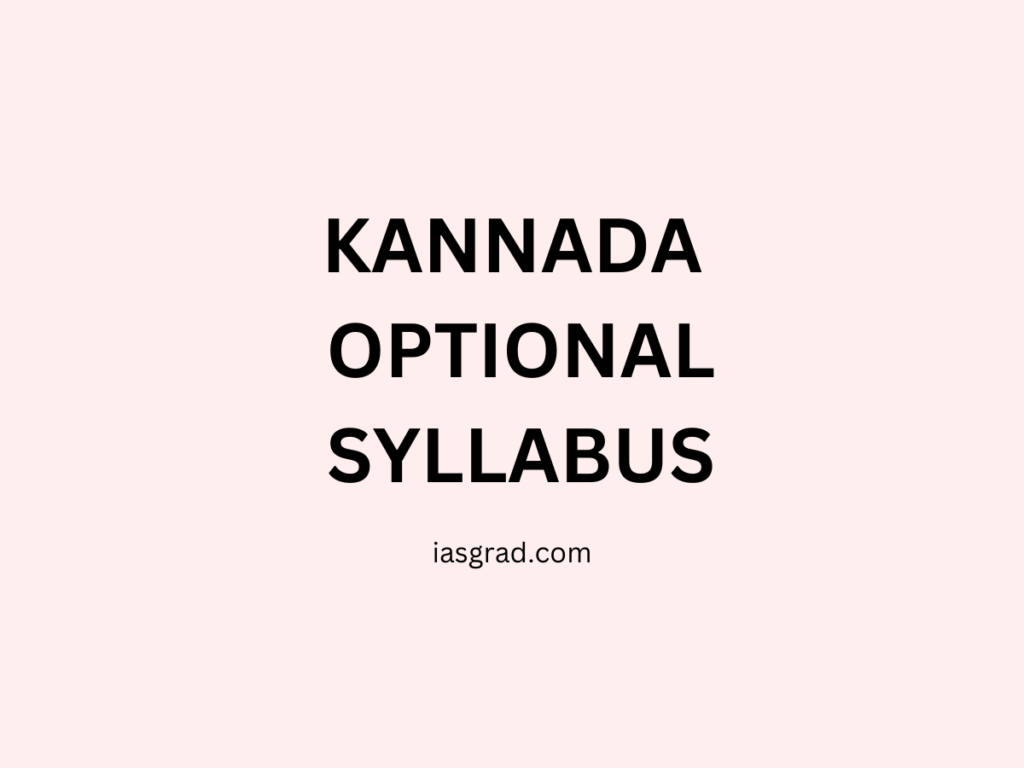Kannada Optional Syllabus
The Kannada Optional for the UPSC Civil Services Exam is a suitable choice for candidates with a strong interest in the Kannada language and literature. The syllabus covers a vast spectrum of Kannada literary works, from classical to modern, and includes poetry, drama, fiction, and literary criticism. It allows aspirants to explore the cultural heritage of Karnataka through its literary tradition and gain insights into the socio-political contexts that shaped Kannada literature. This post provides a detailed breakdown of the syllabus.
Paper I: Kannada Optional Syllabus
-
Section A:
-
History of Kannada Language-1
- What is Language ? General characteristics of Language. Dravidian Family of Languages and its specific features. Antiquity of Kannada Language. Different phases of its Development.
- Dialects of Kannada Language : Regional and Social. Various aspects of developments of Kannada Language: phonological and Semantic changes. Language borrowing.
-
History of Kannada Literature-2
- Ancient Kannada literature : Influence and Trends, Poets for study : Specified poets from Pampa to Ratnakara Varni are to be studied in the light of contents, form and expression : Pampa, Janna, Nagachandra.
- Medieval Kannada literature : Influence and Trends.
- Vachana Literature : Basavanna, Akka Mahadevi.
- Medieval Poets : Harihara, Raghavanka, Kumara-Vyasa.
- Dasa literature : Purandara and Kanaka.
- Sangataya : Ratnakarvarni
- Modern Kannada literature : Influence, trends and ideologies, Navodaya, Pragatishila, Navya, Dalita and Bandaya.
-
-
Section B:
-
Poetics and Literary Criticism:
- Definition and concepts of poetry; Word, Meaning, Alankara, Reeti, Rasa, Dhwani, Auchitya.
- Interpretations of Rasa Sutra. Modern Trends of literary criticism : Formalist, Historical, Marxist, Feminist, Post-colonial criticism.
-
Cultural History of Karnataka:
- Contribution of Dynasties to the culture of Karnataka: Chalukyas of Badami and Kalyani, Rashtrakutas, Hoysalas, Vijayanagara rulers, in literary context.
- Major religions of Karnataka and their cultural contribution.
- Arts of Karnataka ; Sculpture, Architecture, Painting, Music, Dance—in the literary context.
- Unification of Karnataka and its impact of Kannada literature.
-
Paper II: Kannada Optional Syllabus
-
Section A:
-
Old Kannada Literature:
- Vikramaarjuna Vijaya of Pampa (Cantos 12 & 13), (Mysore University Pub.)
- Vaddaraadhane (Sukumaraswamyia Kathe, Vidyutchorana Kathe)
-
Medieval Kannada Literature:
- Vachana, Kammata, Ed. K. Marulasiddappa K.R. Nagaraj (Bangalore University Pub.)
- Janapriya Kanakasamputa, Ed. D. Javare Gowda (Kannada and Culture Directorate, Bangalore)
- Nambiyannana Ragale, Ed., T.N. Sreekantaiah (Ta. Vem. Smaraka Grantha Male, Mysore)
- Kumaravyasa Bharata : Karna Parva (Mysore University)
- Bharatesha Vaibhava Sangraha Ed Ta. Su. Shama Rao (Mysore University)
-
-
Section B:
-
Modern Kannada Literature:
- Poetry : Hosagannada Kavite, Ed. G.H. Nayak (Kannada Saahitya Parishattu, Bangalore)
- Novel : Bettada Jeeva—Shivarama Karanta Madhavi—Anupama NiranjanaOdalaala-Deva-nuru Mahadeva
- Short Story : Kannada Sanna Kathegalu, Ed. G.H. Nayak (Sahitya Academy, New Delhi)
- Drama : Shudra Tapaswi—Kuvempu. Tughalak—Girish Karnad.
- Vichara Sahitya : Devaru—A.N. Moorty Rao (Pub: D.V.K.Moorty, Mysore.)
-
Folk Literature:
- Janapada Swaroopa—Dr. H.M. Nayak. (Ta. Vem. Smaraka Grantha Male, Mysore.)
- Janpada Geetaanjali—Ed. D. Javare Gowda.(Pub : Sahitya Academy, New Delhi).
- Kannada Janapada Kathegalu—Ed. J.S. Paramashiviaah (Mysore University).
- Beedi Makkalu Beledo. Ed. Kalegowda Nagavara (Pub : Bangalore University).
- Savirada Ogatugalu—Ed. S.G. Imrapura.
-
